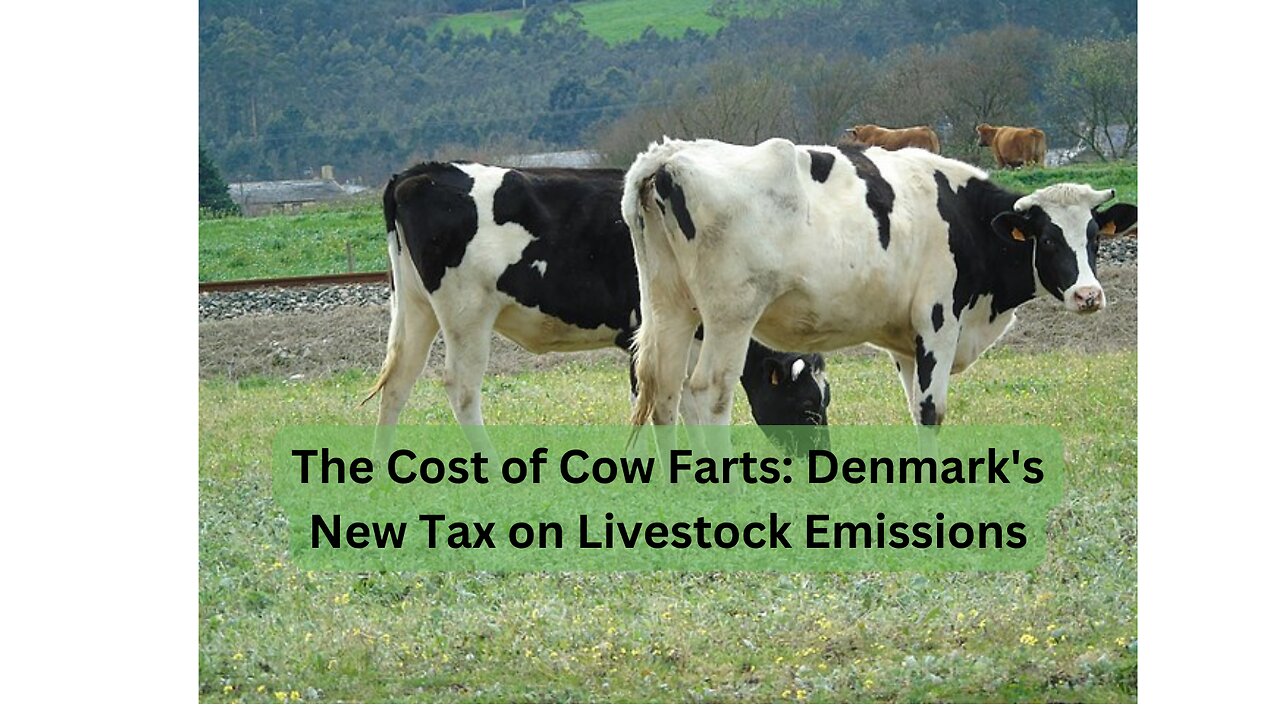Premium Only Content

Denmark's Bold Plan: Taxing Cow Farts to Save the Planet!
To achieve a planned 70 percent reduction in greenhouse gas emissions by 2030, Denmark will soon tax methane emissions from livestock such as cows, sheep, and pigs. This initiative makes Denmark the first country in the world to specifically target methane as part of its efforts against global warming, focusing primarily on the agriculture industry.
Taxation Minister Jeppe Bruus announced that livestock farmers must comply with new regulations to measure and tax the gas released by animals during their daily activities. Starting in 2030, Danish livestock farmers will pay 300 kroner (about $43) per ton of carbon dioxide (CO2) equivalent emissions, increasing to 750 kroner (around $108) by 2035. Due to a 60 percent income tax deduction, the actual cost to farmers will start at 120 kroner ($17.30) in 2030 and rise to 300 kroner ($42.95) by 2035.
"We will take a big step closer to becoming climate neutral in 2045," Bruus stated, emphasizing that Denmark will be the first country to introduce a real CO2 tax on agriculture, hoping other nations will follow suit.
(Related: Last Christmas, Denmark saw a surge in "white lung syndrome," a type of pneumonia also reported in China at the time.)
New Zealand had planned a similar tax on livestock emissions starting in 2025 but abandoned it after heavy criticism from farmers and a significant political shift in 2023. Currently, New Zealand excludes agriculture from its emissions trading scheme, which still aims to reduce emissions under the guise of environmental responsibility.
Denmark's government has not yet detailed how it will measure the gas emissions from each animal to enforce the new tax. Critics argue that these measures are more about controlling the population and increasing taxes rather than genuinely addressing environmental concerns.
One commenter argued that these policies aim to control the population and extract more money from the public. Another pointed out that historical events, like the mass killing of bison in the 1870s, did not lead to significant climate changes, suggesting that livestock emissions are not a major climate factor. Others highlighted that CO2 is not the primary driver of planetary temperatures, attributing climate changes to solar cycles instead.
The debate continues, with many believing that the fear surrounding climate change has led to extreme and irrational measures.
-
 3:59
3:59
Conspiracy Chronicle
6 months agoRadioactive Shipment Disappears in New Jersey—Are Drones on the Hunt?
2071 -
 LIVE
LIVE
The Charlie Kirk Show
1 hour agoThe Amnesty Red Line + The Epstein Un-Conspiracy? + Texas Floods | Bergquam, Marlow, Rep. Donalds
5,055 watching -
 LIVE
LIVE
Donut Operator
1 hour agoFLOODS/ CRIME/ HELP: VENMO @CPVFDTX
500 watching -
 LIVE
LIVE
Grant Stinchfield
51 minutes agoRed Hat Rain Dance? The Left’s New Trump Derangement Deluge!
119 watching -
 LIVE
LIVE
Badlands Media
8 hours agoY Chromes Ep. 40
345 watching -
 LIVE
LIVE
Neil McCoy-Ward
41 minutes ago🔥 Economic Bloodbath Incoming...
79 watching -
 1:08:41
1:08:41
The Rubin Report
2 hours ago'Shark Tank' Legend Visibly Shocks Hosts with a Dark Prediction & Simple Facts
116K51 -
 LIVE
LIVE
LFA TV
22 hours agoLFA TV ALL DAY STREAM - MONDAY 7/7/25
4,020 watching -
 LIVE
LIVE
The Mel K Show
1 hour agoMORNINGS WITH MEL K - Let the Games Begin: Restoring the Constitution & Rule of Law 7-7-25
924 watching -
 LIVE
LIVE
Flyover Conservatives
12 hours agoCrime, Cartels & Corruption: The Collapse of the Golden State - Chris Moritz | FOC Show
356 watching